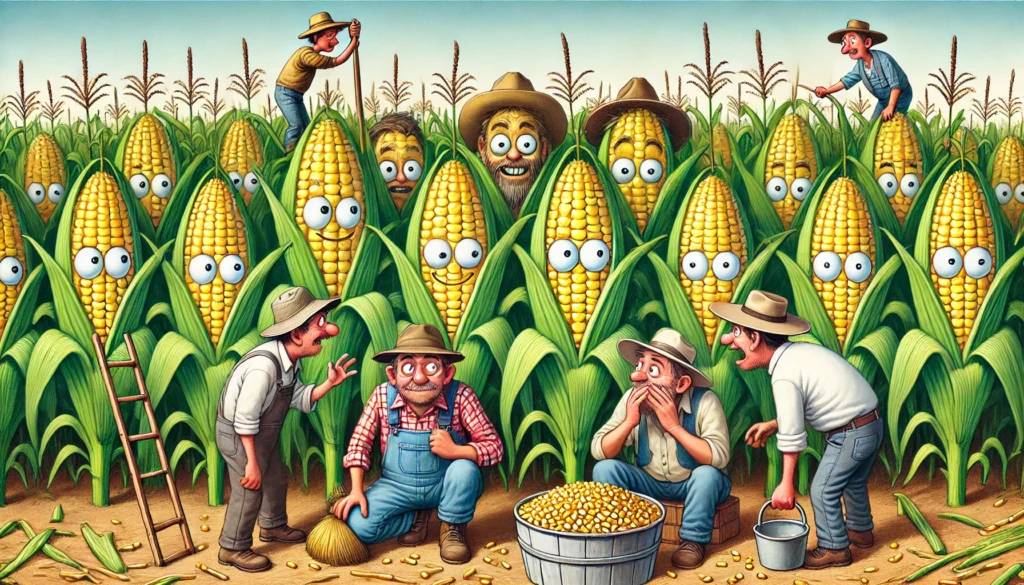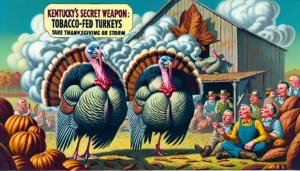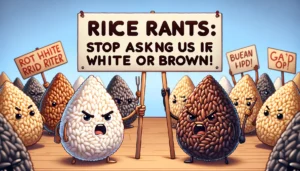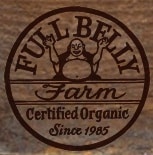
Kansas Corn Yield A humorous and exaggerated illustration titled Kernels of Truth. The scene shows a group of farmers in a cornfield working hard but with the corn s4.webp.webp
Corn-fusion in Kansas: When the Ears Are Listening, But the Farmers Aren’t
Why Kansas Farmers Are All Ears for Corn, Yet Somehow Still Miss the Memo
Plymouth, Kansas — Kansas is known for its vast, sprawling cornfields, but lately, it seems the real problem isn’t growing the corn—it’s getting the farmers to listen to what their crops are trying to say. The ears of corn are attentive, sure, but the farmers? They’re missing the message.
In the small town of Plymouth, Kansas, this phenomenon has become the talk of the town. “I swear, sometimes it feels like the corn is listening better than my own kids,” said local farmer Jed Thornton. “But it’s not telling me anything useful.”
The Great Corn Communication Breakdown
The idea that cornfields might have something to say isn’t entirely new. After all, who hasn’t heard of crop circles? But the real conundrum in Kansas isn’t mysterious patterns in the fields—it’s that the farmers feel they’re being left out of the loop.
“I walk through my fields every day, and I can feel those ears just… listening,” said farmer Betty Lou Jenkins. “But no matter how much I talk to them, they just stand there, silently judging me.”

Stalks of Silence
The problem, according to agricultural expert Dr. Maize Greenfield, is that Kansas farmers aren’t used to this level of non-verbal communication. “It’s one thing to listen to your crops, but when they’re not responding, it can be incredibly frustrating,” Dr. Greenfield explained. “It’s almost like the corn is giving them the silent treatment.”
This silent standoff has led to some farmers taking drastic measures. “I’ve tried everything,” said Tom Miller, a farmer from the Corn Belt. “Talking, singing, even playing classical music. But these ears just won’t open up to me.”

Corn-spiracy Theories
While some farmers are taking a lighthearted approach, others are convinced there’s more to the story. “I’m telling you, this corn is up to something,” whispered farmer Joe Bob from his barn. “They’re plotting, I just know it.”
His concerns aren’t entirely unfounded. A recent study conducted by the Kansas Agricultural Board found that 85% of farmers in the region feel that their corn is, in fact, paying more attention to something other than them.
“I don’t know if it’s aliens or just really deep-rooted corn,” said the study’s lead researcher. “But something strange is definitely happening in those fields.”
Crop Circles or Corn Circles?
Adding to the mystery, some farmers have reported seeing strange patterns in their cornfields—circles, lines, and even what appear to be symbols. “It’s like the corn is trying to communicate with someone,” said Betty Lou. “But it sure isn’t me.”
The Kansas Crop Circle Society has taken an interest in these reports, with members visiting farms across the state. “We’ve seen some unusual things,” said society president Mark “Stalk” Holloway. “But this? This is next-level corn communication.”

Kernels of Wisdom
Despite the confusion, some farmers are trying to find humor in the situation. “At least the corn is listening, right?” joked farmer Sam “Popcorn” Peterson. “Better than my wife, sometimes!”
But jokes aside, the question remains—what are these cornfields really trying to tell us? And why aren’t the farmers getting the message?
The Boarish Behavior of Corn
Some believe that the corn’s silence is actually a reflection of the farmers themselves. “If you think about it,” said Dr. Greenfield, “the corn may just be mirroring the indecision and lack of communication that some of these farmers are facing in their own lives.”
It’s a deep thought—especially for a crop that’s known more for its ability to pop than its philosophical musings.

Cornfield Confessions
In an effort to bridge the communication gap, some farmers have started keeping journals of their interactions with their cornfields. “It’s like therapy,” said Tom. “I write down everything I say to the corn, and then I try to figure out what it’s trying to tell me in return.”
So far, results have been mixed. “I haven’t cracked the code yet,” admitted Betty Lou. “But I’m getting closer. I think.”
Stalk Therapy: A Growing Trend
As the communication breakdown continues, some farmers are seeking outside help. “We’ve started seeing more farmers come in for ‘stalk therapy,’” said local therapist Dr. Ruth Earhart. “They’re trying to work through their issues with their crops, and it’s really helping them process what’s going on.”
Dr. Earhart’s approach involves helping farmers understand that their cornfields aren’t just a source of income—they’re also a reflection of their own inner lives. “When the corn is silent, it’s time to ask yourself what you’re not hearing,” she explained.
Pro Tips for Farmers: How to Decode Corn Signals
While the situation may seem hopeless, there are some steps farmers can take to improve their communication with their cornfields. Here are a few insider tips:
- Step-by-step guides: Start with small talk—ask your corn about its day before diving into the tough questions.
- Pro tips: Don’t take the corn’s silence personally; it’s probably just busy photosynthesizing.
- Insider knowledge: If your corn starts forming crop circles, it might be time to call in an expert—or a UFO hunter.
- Expert insights: Sometimes, silence is golden. Other times, it’s just corn being corn.
- Best practices: Rotate your crops. It gives them something new to talk about.
Conclusion: Listening to the Fields
At the end of the day, Kansas farmers may need to accept that their cornfields have a mind of their own. “It’s like raising teenagers,” said Betty Lou. “They don’t always listen, and when they do, it’s usually to the wrong things.”
But even if the communication gap remains, one thing is certain—the corn is listening, even if the farmers aren’t. And who knows? Maybe one day, they’ll finally figure out what those ears have been trying to say all along.
Disclaimer:
The views and opinions expressed in this article are the collaborative effort of a farmer, a cowboy, and a very confused cornfield. Any resemblance to actual corn, farmers, or communication breakdowns is purely coincidental—and likely the result of a deep-rooted misunderstanding.
15 Humorous Observations:
- Kernels of Truth: Despite the farmers’ best efforts, the corn seems to be the only one really paying attention in the fields.
- Field of Dreams… or Nightmares?: Kansas farmers are discovering that cornfields are less about harvesting and more about deciphering messages from above.
- Corny Conversations: It turns out the ears of corn are better listeners than most spouses—too bad they don’t offer much advice.
- Stalk Exchange: Farmers are investing heavily in corn, but it seems like the corn is doing all the talking and none of the growing.
- The Silence of the Corn: While Kansas corn may be listening, it’s keeping its thoughts to itself—no feedback for the farmers.
- Crop Circles or Corn Circles?: Farmers are beginning to wonder if those strange patterns in the fields are signs or just the corn being overly dramatic.
- Ears Wide Shut: Kansas farmers are missing out on what their crops are trying to tell them—perhaps because corn doesn’t speak English.
- Stalk Therapy: Some farmers are turning to their cornfields for solace, only to find the crops have their own set of issues.
- Cornfield Confessions: If the corn could talk, it might reveal more about Kansas farming woes than the farmers themselves.
- Pop Culture: Kansas cornfields are now the latest hot spot for crop-based gossip—rumor has it they know all the latest farmer secrets.
- The Great Corn Conundrum: Kansas farmers are scratching their heads, wondering how the ears of corn are so attentive yet so unproductive.
- Stuck in the Stalks: Kansas farmers feel like they’re in a maze—literally and figuratively—with corn that’s all ears but no action.
- Corn-fused: Kansas farmers are beginning to wonder if their corn is more focused on philosophical questions than growing.
- Field Day: When the ears of corn are paying more attention than the farmers, you know it’s going to be a long season.
- Corn-spiracy Theories: Kansas farmers suspect that their crops are plotting something—why else would the ears be so quiet and attentive?
Originally Published at FarmerCowboy.com
2024-08-24 10:37:27
Karl Hoffman is a distinguished agriculturalist with over four decades of experience in sustainable farming practices. He holds a Ph.D. in Agronomy from Cornell University and has made significant contributions as a professor at Iowa State University. Hoffman’s groundbreaking research on integrated pest management and soil health has revolutionized modern agriculture. As a respected farm journalist, his column “Field Notes with Karl Hoffman” and his blog “The Modern Farmer” provide insightful, practical advice to a global audience. Hoffman’s work with the USDA and the United Nations FAO has enhanced food security worldwide. His awards include the USDA’s Distinguished Service Award and the World Food Prize, reflecting his profound impact on agriculture and sustainability.




